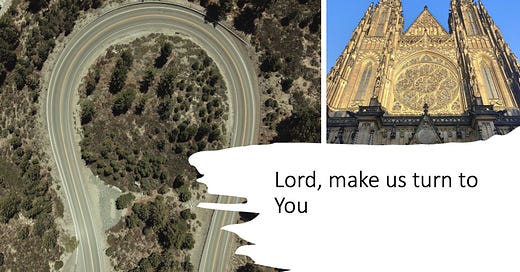Lord, make us turn to You
Psalm 80:2ac and 3b, 15-16, 18-19. December 10, 2022 - Saturday, 2nd Week of Advent
Psalm 80 was probably originally a lament over the destruction of the Northern Kingdom of Israel in 721 BC at the hands of the Assyrian empire. But it was probably reused to lament the destruction of the Southern Kingdom of Judah in 586 BC at the hands of the cruel Babylonian empire. Both events were seen by the prophets as punishment for the sins of idolatry, immorality, and injustice. God, who planted Israel in the Promised Land, allowed it to be destroyed by Israel’s enemies. But the psalmist still asks: Why (see Ps 80:12)?
Contemporary pop theology presents God as only merciful. To talk today about God who can punish seems to be boarding on the verge of heresy. But the history of salvation recorded in the Bible says otherwise. God is merciful no doubt about it, but he also executes punishment for our sins. Unlike many of us, biblical authors accept this truth. But, they do not stop there. They go further than that. They believe that the God who executes punishment is also the God who can heal and save. The author of our psalm is one among them.
The psalm gives us three images of God: God as a shepherd, an agriculturalist, and the One presiding over the hosts of angels. All of them evoke the emotions of security. “The Lord is my shepherd,” says Psalm 23, I do not need to be afraid. Psalm 125 speaks about the Lord protecting his people in the same way the mountains protected Jerusalem from being invaded by enemies. And yet, the Shepherd of Israel allowed his sheep to be scattered among their enemies. The owner of that vineyard removed its protecting wall allowing the enemies to destroy it.
The psalmist does not dwell on the question of why it happened. Instead, he asks the one who executed judgement to show His mercy. “Once again, O Lord of hosts, look down from heaven, and see; take care of this vine” (Ps 80:15). The prayer of the psalmist reminds me of the prayer of Moses after Israel sinned by making and worshipping the golden calf (see Ex 32). But, what should strike us in his prayer is the realisation that without God’s help we are prone to stray away from Him.
Our psalm ends today in this way: “May your help be with the man of your right hand, with the son of man whom you yourself made strong” (Ps 80:18). I immediately think about Jesus Christ, the Son of God and the Son of man, who is sitting at the right hand of the Father. But, the psalmist continues: “Then we will no more withdraw from you; give us new life, and we will call upon your name” (Ps 80:19). God answered this prayer of the psalmist by giving us new life in Jesus Christ. Now, instead of withdrawing from God, we are drawn to God and call upon his name, “Abba, Father”.




